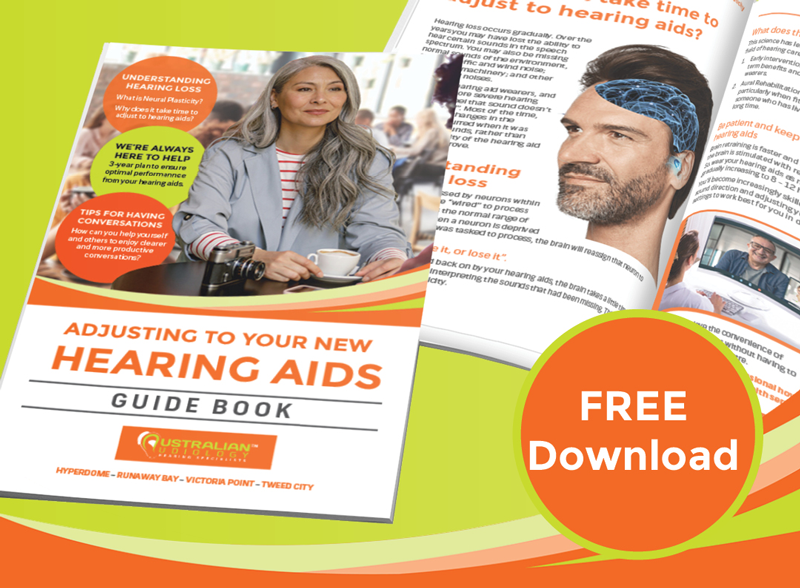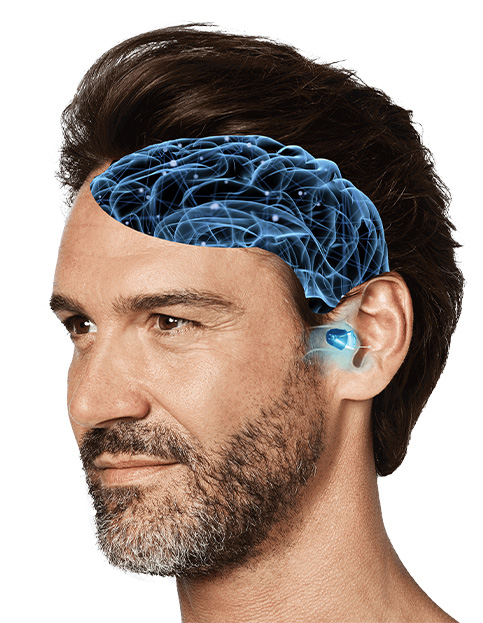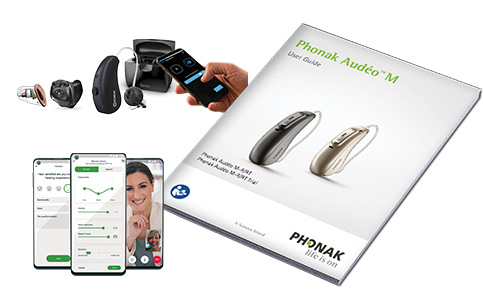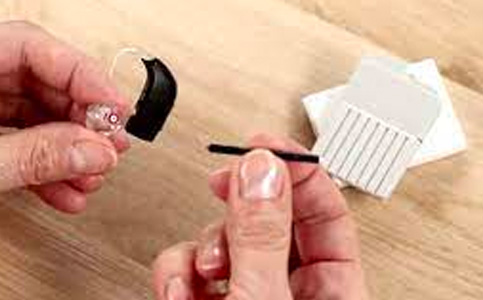Tweed Heads +61 7 5513-0338
Mt Ommaney +61 7 3310-4581
Runaway Bay +61 7 5529-3530
Hyperdome +61 7 5439-0809
Victoria Point +61 7 3207-6247
Mon-Fri, 9AM – 5:30PM
Adjusting to your new hearing aids
So, you were experiencing hearing difficulties and made the important step to adopt hearing aids. While you will once again hear sounds you have been missing, you will still face some challenges. This section will help you understand those challenges and provide you with tips on how to maximise the effectiveness of your hearing aids.
And remember, we’ll be with you every step of the way!
Download Our Free Guide!
We’ve put together this great tool to help you maximise the benefits of your hearing aids. Simply complete the form below to download your FREE Copy!

Why does it take time to adjust to hearing aids?
Hearing loss occurs gradually. Over the years you may have lost the ability to hear certain sounds in the speech spectrum. You may also be missing normal sounds of the environment, such as: traffic and wind noise; the hum of machinery; and other background noises.
First-time hearing aid wearers, and those with more severe hearing losses, may feel that sound doesn’t seem “natural”. Most of the time, this is due to changes in the brain that occurred when it was deprived of sounds, rather than the sound quality of the hearing aid itself. It will improve.
You see, the hearing system is very complex and your brain will require a period of re-education in order to selectively focus, filter, and interpret sounds.
Understanding hearing loss
First-time hearing aid wearers, and those with more severe hearing losses, may feel that sound doesn’t seem “natural”. Most of the time, this is due to changes in the brain that occurred when it was deprived of sounds, rather than the sound quality of the hearing aid itself. It will improve.
Sounds are processed by neurons within the brain, which are “wired” to process frequencies across the normal range of human hearing. When a neuron is deprived of the sound that it was tasked to process, the brain will reassign that neuron to another job.
When sound is turned back on by your hearing aids, the brain takes a little time to reallocate neurons to interpreting the sounds that had been missing. This process is known as Aural Rehabilitation.

Exercises to accelerate 'brain training'
This science has led to two key strategies in the field of hearing care:
- Early intervention produces the greatest long-term benefit and satisfaction for hearing aid wearers.
- Aural Rehabilitation is often necessary, particularly when fitting hearing aids to someone who has lived with hearing loss for a long time.
Read aloud to yourself
Does your voice sound different? Your voice will be louder and could sound like you have a lisp, because you are hearing “s” clearly for the first time in years. Over time, your voice will begin to sound much more natural.

Introduce noises gradually
At first, noisy situations may seem overwhelming with your new hearing aids, but it is important keep persevering. Voices will become clearer and background noise will become less distracting.

Be patient
Hearing aids don’t repair damaged ears, so you won’t achieve the hearing of a healthy 18 year old. Similarly, they won’t completely block out background noise, but that’s ok! Even people with perfect hearing can experience difficulty following conversations in noisy environments.
.
More things you can do to improve your hearing aid experience.
Familiarize yourself with the hearing aids features and controls
- Read through your User Guide. If you understand how to manage settings, wearing your hearing aids will be more effective and comfortable.
- Get familiar with features such as volume control, battery draw, and remote controls.
- Remove and replace (or charge) your hearing aid batteries.

Make sure your hearing aids are clean and well maintained
We’ll show you how to clean and care for your hearing aids. You can also refer to some great online videos and tips found here:
- Cleaning a hearing aid with a slim tube
- Cleaning a hearing aid with an earmold
- Cleaning a custom-fitted hearing aid
.

Contact us at any time!
Australian Audiology Services are here with you every step of the way. If you are struggling in any way, call or drop into your hearing centre at any time! Call us on 1300 864 327.
